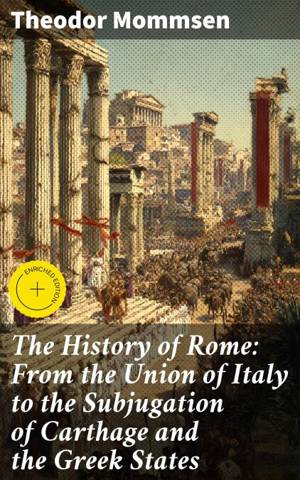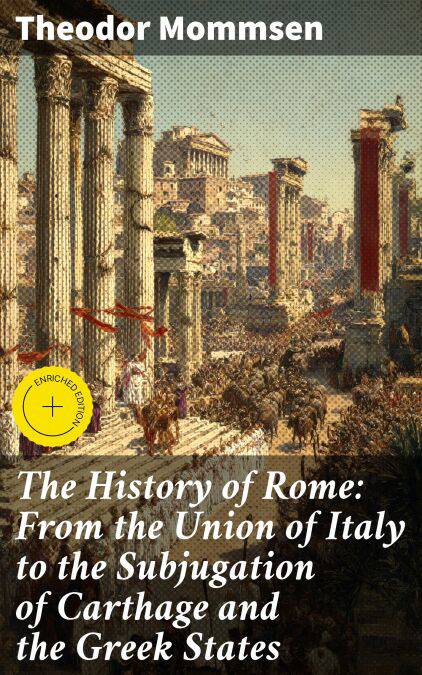
- Afhalen na 1 uur in een winkel met voorraad
- Gratis thuislevering in België vanaf € 30
- Ruim aanbod met 7 miljoen producten
- Afhalen na 1 uur in een winkel met voorraad
- Gratis thuislevering in België vanaf € 30
- Ruim aanbod met 7 miljoen producten
Zoeken
The History of Rome: From the Union of Italy to the Subjugation of Carthage and the Greek States E-BOOK
Enriched edition. Unveiling Rome's Ascendance: Conquests, Politics, and Power
Theodor Mommsen
E-book | Engels
€ 1,99
+ 1 punten
Omschrijving
In "The History of Rome: From the Union of Italy to the Subjugation of Carthage and the Greek States," Theodor Mommsen presents a meticulously crafted narrative that chronicles the transformative events of the Roman Republic from the late 4th century BC to the Roman conquest of Carthage and the Greek territories. Mommsen's literary style is characterized by its vivid prose and analytical rigor, blending historical detail with engaging storytelling. The work is situated within the broader literary context of 19th-century historiography, where Mommsen's unique perspective illuminates the socio-political dynamics of ancient Rome, presenting a richly textured view of its rise and imperial ambitions. Theodor Mommsen, a German classical scholar and politician, was awarded the Nobel Prize in Literature in 1902 for this very work, which reflects his deep engagement with Roman history and its lasting implications on Western civilization. His extensive studies in philology and archaeology informed his comprehensive approach to history, linking the political and military events of Rome with the cultural evolution of its society. Additionally, his commitment to civic duty and belief in progress may have influenced his interpretation of Rome as a model of governance and civilization. Readers seeking to deepen their understanding of Roman history will find Mommsen's work indispensable. With its scholarly depth and eloquent presentation, this book not only serves as a foundational text for aspiring historians but also appeals to general readers fascinated by the complexities of ancient Rome. Drawing from timeless historical insights, Mommsen's narrative invites reflection on the nature of power and its consequences, making it a compelling read for anyone interested in the legacies that shape our modern world.
In this enriched edition, we have carefully created added value for your reading experience:
- A succinct Introduction situates the work's timeless appeal and themes.
- The Synopsis outlines the central plot, highlighting key developments without spoiling critical twists.
- A detailed Historical Context immerses you in the era's events and influences that shaped the writing.
- An Author Biography reveals milestones in the author's life, illuminating the personal insights behind the text.
- A thorough Analysis dissects symbols, motifs, and character arcs to unearth underlying meanings.
- Reflection questions prompt you to engage personally with the work's messages, connecting them to modern life.
- Hand‐picked Memorable Quotes shine a spotlight on moments of literary brilliance.
- Interactive footnotes clarify unusual references, historical allusions, and archaic phrases for an effortless, more informed read.
In this enriched edition, we have carefully created added value for your reading experience:
- A succinct Introduction situates the work's timeless appeal and themes.
- The Synopsis outlines the central plot, highlighting key developments without spoiling critical twists.
- A detailed Historical Context immerses you in the era's events and influences that shaped the writing.
- An Author Biography reveals milestones in the author's life, illuminating the personal insights behind the text.
- A thorough Analysis dissects symbols, motifs, and character arcs to unearth underlying meanings.
- Reflection questions prompt you to engage personally with the work's messages, connecting them to modern life.
- Hand‐picked Memorable Quotes shine a spotlight on moments of literary brilliance.
- Interactive footnotes clarify unusual references, historical allusions, and archaic phrases for an effortless, more informed read.
Specificaties
Betrokkenen
- Auteur(s):
- Vertaler(s):
- Uitgeverij:
Inhoud
- Aantal bladzijden:
- 527
- Taal:
- Engels
Eigenschappen
- Productcode (EAN):
- 8596547506614
- Verschijningsdatum:
- 11/08/2023
- Uitvoering:
- E-book
- Beveiligd met:
- Digital watermarking
- Formaat:
- ePub

Alleen bij Standaard Boekhandel
+ 1 punten op je klantenkaart van Standaard Boekhandel
Beoordelingen
We publiceren alleen reviews die voldoen aan de voorwaarden voor reviews. Bekijk onze voorwaarden voor reviews.








